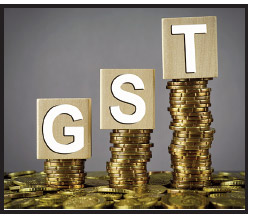
 |
MATTERS OF PUBLIC POLICY
Looking beyond GSTIn economic swaraj lies India's future
Looking beyond the magic of common market of the three words of GST, we have to simultaneously and actively think of millions of poor people and the have-nots who are still groaning under the weight of denial and deprivation. forward together. This will require better
communication and active consultation mechanism
between the Centre and the States, irrespective of
ideological and political differences, if any.
The Prime Minister has hailded GST as a "good and
simple tax" which, according to him, should help
business persons and put an end to "Tax Terrorism" and
"Inspector Raj", while contributing to the welfare of the
people and fight against corruption and black money.
Going by the experience of the operational system in
the country during the past 70 years, the Prime
Minster's words, though reassuring, right now appear
too good to be true.
As it is, leaders and babus at the local and state levels
lack a sense of commitment to national goals and
objectives. Instead of working for the welfare of the
public, they work for themselves. To bring about a change in this mindset involves transitional pain and
adjustment. For this purpose, the ruling elite has to set
the right pace for social and economic justice on secular
and egalitarian principles. "History advances in disguise; it appears on the stage wearing the mask of the passing of the preceding scene and we tend to lose the meaning of the play. Each time the curtain rises, the continuity has to be reestablished. The blame, of course, is not history's, but lies in our vision, encumbered with memory and images learnt in the past. We see the past superimposed on the present even when the present is a revolution". I am sure the Prime Minister will get the message so beautifully narrated by Regis Debray. We are probably not yet cut out for a revolution, as was once passionately talked about by our former Supreme Court judge, Justice Markandey Katju in an interview with a media person. On the ground, there are signs of socio-economic
unrest, which are generally overlooked by the ruling
elite as a matter of convenience. Then, what is to be
done if the leadership vision happens to be terribly
blurred and even the mask loses the shine of the
"preceding scene". As, it is, the twin pillars of
governance of India – the civil service and education
institutions – are showing signs of cracks.
It is quite disquieting that the road ahead is littered
with fanaticism and all forms of distortions. Even the
concept of secularism and democratic values are being
twisted and tattered by
opportunistic politicians,
spineless bureaucrats and their
collaborators. While welcoming the GST reform, restless audience in the Indian political theatre today want their leaders to act firmly and decisively and fulfill hosts of promises of a government that works faster for the good of the people in the streets as well as for the uplift of farmers left behind in the economic march. We need to realize that Indian politics does not
follow straight line even in matters of economic reforms
and ushering in the dream concept of economic swaraj
(economic freedom). "Swaraj" is the kind of liberation in which our people discover their truth, the truth of India. Freedom means not just political independence, but the freedom of each individual to become himself, only within the stream of communion of people with people". I believe that economic
swaraj – economic freedom –
can help us restore and
recreate the fabric of an
integrated and forwardlooking
national society as we all dream about. Mr.
Prime Minister, if we are serious about making the GST
system "the most relevant for the poor" and their
welfare as you believe in, what is vital is to put the
nation before the party and individual interest without
using the poor and caste factors as part of vote bank
politics! |
|


